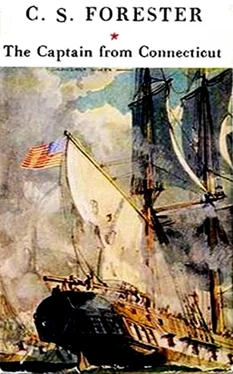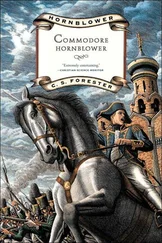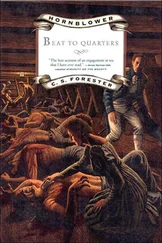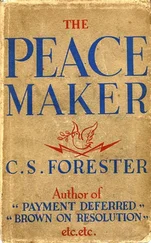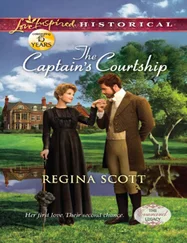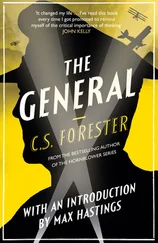1 ...6 7 8 10 11 12 ...15 It was a comforting sensation to have an ample crew, with every man an able seaman, and even the ship’s boys seventeen years old and upward; there had been no difficulty whatever in enlisting a crew in New York when the Delaware commissioned. And yet the captain of the two-decker, if he knew his business, would be able to nullify all these arrangements at his will. He could lie three cables’ lengths from the Delaware, beyond the effective range of her carronades, and pound her to pieces with the long guns on his upper deck. Probably that English captain knew his business, too—he had proved it by bringing his big ship through Plum Gut in the night and guessing the Delaware’s future course, Peabody allowed the hatred he felt for his implacable foe to well up freely within him.
He went back to where the stern chasers were still banging away. “We’ve hit her eight times, sir,” said Murray, in a sort of ecstasy. Powder smoke and the din of the guns were like drink to him.
“Aim high and try to wing him,” said Peabody.
“Aye aye, sir,” said Murray, and then, respectfully, “I’ve been trying to, sir.”
He bent to squint along the gun again, gave a couple of twirls to the elevating screw, and then stood aside and jerked the lanyard. The gun roared out and recoiled; it was so hot now that it leaped in its carriage at the discharge.
“That went close,” said Peabody. “Try again.”
The sponge on its flexible handle was thrust up the gun, and the water with which it was soaked hissed against the hot metal. Someone whipped a paper cartridge of powder from out of the bucket which guarded it from spray, ripped it open and pushed it into the muzzle. The rammer thrust it further in, and then the big felt wad was thrust in in its turn, the rammer packing the charge hard up into the breach; slovenly packing might diminish the power of the shot by as much as a quarter. Then the ball went rolling down on top of the charge, and another wad was rammed down upon it to hold everything secure. Murray stood aside with the lanyard in his hand, watching the motion of the ship. Suddenly he jerked the lanyard and the gun came leaping back upon its breachings while the wind whisked the smoke round the gun-crew’s faces for a second before heaving it forward.
Peabody looked for the flight of the ball, but this time he missed it. And then, as he stared, he saw the two-decker’s foretopsail suddenly shut down upon itself. From a clear-cut oblong it changed into a vague strip cock-eyed across the foremast and shaking in the wind. Someone started to cheer, and the cheering spread along the deck, but it had not reached its full volume before the two-decker, deprived of the balancing pressure of her foretopsail, came round abruptly into the wind.
“That’s her foretopsail tie gone, sir,” said Hubbard, standing at his side. His lean face with its high arched nose showed more animation than usual.
“More likely the slings,” said Peabody. He had whipped his glass to his eye, and through it he saw the fore rigging of the two-decker black with men struggling with the wreckage. “That was a good shot, Mr. Murray.”
But Murray did not hear; he was already sighting his gun again, absorbed in the business of doing as much damage as possible. As Peabody put his glass to his eye again he saw the two-decker’s broadside momentarily shrouded in smoke, and directly afterwards he was conscious of a tremendous crash beside him. A shot from the two-decker had smashed a hole in the bulwark and ploughed its way along the quarterdeck; splinters hummed round him and two men serving the other stern chaser lay mangled in pools of blood. There were other men staring stupidly at wounds inflicted by the splinters, and when he looked forward he saw other men lying dead on the deck, while two severed mainmast shrouds on the starboard side showed where the ball had found its way out of the ship again.
“Get those shrouds spliced and set up again, Mr. Hubbard,” said Peabody.
Crippled the two-decker might be, but she was determined on inflicting the utmost possible damage before her antagonist escaped out of range. The two stern chasers roared out their defiance; the surgeon’s crew were already carrying the wounded below in their canvas chairs and dragging the dead out of the way. Again the two-decker was wreathed in smoke, and Peabody found time to feel a momentary misgiving lest this broadside should do more damage than merely parting a couple of shrouds. But even as the thought came into his head he saw two jets of water rise from a wave top a cable’s length astern—the danger was past, and although two guns had been well pointed they had not been given sufficient elevation.
“She’s out of range, sir,” said Murray, turning back to him from his gun.
“Yes, Mr. Murray, thanks to you,” said Peabody.
Murray showed a gleam of white teeth in his smoke-blackened face.
“Thank you, sir,” he said.
Peabody remembered Stephen Decatur’s words of thanks to him when they met, sword in hand, on the deck of the captured Khaided-Din in Tripoli harbour, and how he himself had stood flushed and tongue-tied and unable to reply.
“I’ll remember this in my report to the Commodore,” said Peabody. “Now get those guns secured.”
He realised now that he and everyone else on the quarterdeck were soaked to the skin by the spray which had come in through the gunports, and he was shuddering with cold and lack of exercise. His heavy pea-jacket was wet as a soaked sponge and hung like lead from his shoulders. Looking through his glass he could see men still hard at work on the two-decker’s foretopsail yard; they looked like ants on a twig. It would be fully ten minutes before the two-decker got before the wind again; in ten minutes they would be a mile farther away; to regain that mile would take the two-decker at least two hours, if not more; and in less than four hours it would be dark. They were almost safe—as safe as any United States ship could be on a sea whose length and breadth was searched and scanned by the British fleet.
Hubbard had the hands at the braces trimming the sails, and Peabody looked sharply up at the commission pennant fluttering from the maintopmast. The wind had backed noticeably, and, just as important, it was moderating.
“Set the mizzen tops’l and jib again, Mr. Hubbard,” said Peabody.
“Aye aye, sir.”
Hubbard stood beside his captain with his eyes on the men casting off the gaskets and a wry smile on his long face.
“We can just walk away from that old tub now, sir,” he said. “It would ha’ saved us a bit of trouble if the wind had made up its mind sooner.”
Peabody stared at him. The dead men were lying by the spars, forward; their lives would have been saved, undoubtedly, but apart from that—Providence helps those who help themselves. Peabody’s philosophy was such—illogical though he would have admitted it to be if he had happened to analyse his feelings—that to him it was the most natural thing in the world for the wind to shift and moderate after his own efforts had made the change almost unnecessary. To grumble at the whims of uncontrolled natural forces—at the dictates of Providence—was a little absurd to him, like a heathen beating his god for not responding to prayer. He was growing a little set in his ways of thought.
The Delaware had crossed the blue water of the Gulf Stream. She had caught the north-east trades by now, and was thrashing along with the wind over her port quarter and with all sail set, driving so hard that Mr. Hubbard was keeping an eye on the studding sails lest there should be a trifle too much strain on the booms. The blue water—so blue that it might have been a painted surface—turned to a dazzling white as the Delaware broke through it, and in the waves thrown off from her sharp bow a dozen dolphins tumbled and somersaulted.
Читать дальше
